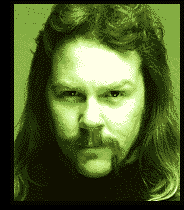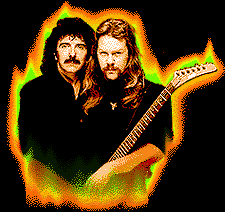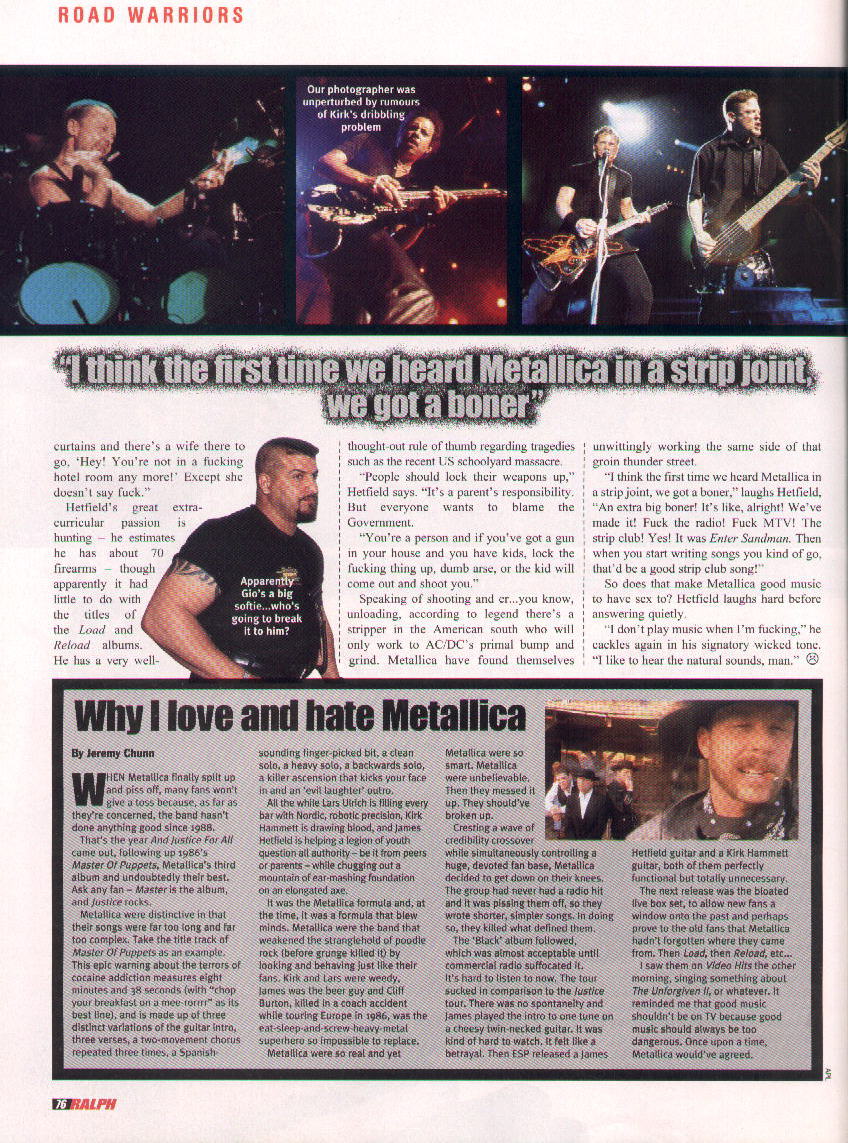


Iron Men
By Brad Tolinski with Alan Paul
Tony Iommi and James Hetfield arrive for the Great Encounter decked out in black. No one seems particularly surprised by their matching color scheme. In fact, it would be cause for concern if they didn't look like twin executioners. Black, after all, is the official color of heavy metal royalty-and these are the kings of kings.
Despite their similar attire, Iommi and Hetfield' s demeanors provide sharp studies in contrast. Iommi, with his dark eyes, meticulously groomed moustache and soft English accent, has the dignified bearing of a British noble man. The blond, gravelvoiced, sharp-tongued Hetfield, on the other hand, has the guarded, hulking aspect of an urban street-fighting man.
James' gruff exterior, however, disintegrates in a puff of worshipful smoke as soon as he greets Black Sabbath's legendary guitarist, who had arrived just moments earlier. "It's a pleasure to finally meet you, man," Hetfield says with genuine enthusiasm.
Iommi is quick to respond with a volley of compliments. "My son bought me your last album, and it's one of first recordings I've received in a long time that I can praise without reservation. I listen to it in my car all the time." Hetfield beams at these unqualified words of approval from hard rock's original god of thunder.
As the leader of Black Sabbath, Iommi pioneered an entire school of dense, ominous, highly amplified music, which eventually became known as heavy metal. Though many guitarists explored power chords and distorted guitars in the psychedelic Sixties, Iommi was the first guitarist to make these musical elements a personal obsession.
The original Sabbath lineup-Iommi, singer Ozzy Osbourne, bassist Geezer Butler and drummer Bill Ward-first coalesced in 1968 as Earth, playing pop and blues. The following year the group discovered volume, overdrive and paranoia, and celebrated their find by adopting the sinister Sabbath moniker. Shortly thereafter, the band released Black Sabbath, the first of its series of hell-raising masterpieces on Warner Brothers. Paranoid (1970), Master Of Reality (1971), Sabbath Bloody Sabbath (1975) and Heaven And Hell (1980), with replacement vocalist Ronnie James Dio, followed in fiendish succession.
Although their music was despised by critics and ignored by radio programmers, the band's special brand of doom and gloom sold millions of records. Iommi's radically detuned Gibson SG and his inventive soloing became the major source of inspiration for such guitarists as Edward Van Halen, Kim Thayil and, of course, the young James Hetfield, who went on to cofound the modern-day rock juggernaut, Metallica.
"I discovered Black Sabbath by digging through my o!der brother's record collection," recalls Hetfield. "Their album covers really drew me in. I immediately thought, `I gotta put this on.' And when I did, I couldn't believe it. It was like, `Whoa! Heavy as shit.' Sabbath was everything that the Sixties weren't. Their music was so cool because it was completely anti-hippie. I hated the Beatles, Jethro Tull, Love and all that other happy shit." Though Black Sabbath has through the years had its ups and downs and endured numerous traumatic personnel changes, Iommi and company are back, stronger than ever, with Dehumanizer. The album features a fresh lineup that includes Dio, Butler and veteran drummer Vinny Appice.
"If you like songs like `War Pigs,' then you'll like this one," says Iommi. "There are a lot of heavy riffs, and it' s real raunchy."
The invocation of the very appropriate terms "real" and "raunchy" is a good place .o turn to our historic interview with guitar iorcerer Tony Iommi and his second-generation apprentice, James Hetfield. We convened in the booth of a seedy Manhattan bar, where the jaded clientele remained oblivious to the presence, in a secluded rear booth, of two of rock and roll's greatest heavyweights.
GUITAR WORLD: Tony, what were your earliest influences?
TONY IOMMI: In the beginning I was primarily influenced by old blues records. Since liner notes on most blues 78's were either sketchy or non- existent, I never knew who half of the musicians were. I still don't. But those were my first influences, and my first bands were straight blues bands.
GW: How did you make the jump from playing traditional blues to composing the heavy, riff-oriented music that characterized Black Sabbath?
IOMMI: Well, to be honest, we just became so fed up with people talking while we were playing that we just said, "Screw it, let's turn it up, so they won't be able to chatter." [laughs] The band just kept getting louder and louder.
GW: James, how did Metallica come to pioneer thrash metal?
JAMES HETFIELD: Like Tony, we also played cover tunes when we first started. We were really influenced by the New Wave Of British Heavy Metal, which included bands like Venom and Diamond Head-underground stuff. We learned a bunch of their songs from a batch of obscure singles that Lars [Ulrich, Metallica drummer] had collected. Most people thought we were performing originals, because they had never heard any of this shit before-which was good for us! We took all the credit. You know: "Hey, you guys write good songs." "Yeah, I know." [laughs] We certainly weren't going to tell them the truth. Eventually we started playing everything faster because, like Sabbath, the crowd wasn't paying any attention to us and that pissed us off. In L.A., people were just there to drink and see who else was in the club. We decided to try to wake everybody up by playing faster and louder than anybody else. Nervousness also contributed to our sound. Lars was always nervous on stage, so he'd play faster and faster. That was a huge challenge for us, but nobody wanted to wimp out and tell him that he was playing too fast. We just figured, "Hell, we'll just play fast too." So it became part of a game.
GW: Tony, was it hard to play in a tough British factory town like Birmingham?
IOMMI: It had an effect on us. We were completely surrounded by violence and pollution, so that was a big part of our music. We were living our music.
GW: Weren't you and Ozzy Osbourne actually in different street gangs?
IOMMI: Yeah, I used to hate the sight of Ozzy. I couldn't stand him, and I used to beat him up whenever I saw him. We just didn't get on at school. He was a little punk. It's pretty amazing that he eventually became part of Sabbath. Bill [Ward, Sabbath drummer] and I were looking for a singer, and we spotted this advert that said, "Singer looking for a gig. Call Ozzy at..." I said to Bill, "I know an Ozzy. It can't possibly be that one." So we went to the address listed in the ad and knocked on the door. Sure enough, Ozzy appeared. I said to Bill, "Forget it, forget it." But Bill wanted to chat with him. We talked, but when we left I said, "No way, Bill, I know him." Three weeks later, we ended up together anyway. Life moves in mysterious ways.
GW: Tony, what's your craziest Ozzy Osbourne story?
IOMMI: I don't know-there's so many. [chuckles] Wait, here's one. Actually, it's quite funny. We were all in an elevator in this real plush hotel, and Ozzy decides to take a crap. As he's doing it, the elevator is going down to the reception floor. The door suddenly opens-and there's Ozzy with his pants around his knees. And all these people in fur coats are just staring at him with their mouths open. [laughs]
HETFIELD: I heard one story, that Bill Ward showed up to go on tour one time with his only suitcase filled with beer. Is that true?
IOMMI: Well, Bill never used to take many clothes at all. And when he did, he'd have two suitcases: one with dirty clothes, and the other one with dirtier clothes. Bill was a character! Bill was our outlet, the one everybody picked on. I used to do terrible things to him. I actually set him on fire once- honest to God. We were recording Heaven And Hell [Warner Bros., 1980], and I said to Bill, "Can I set you on fire?" And he said, "Well, not now, not now." So I said, "Okay," and then forgot all about it. An hour later Bill said, "Well, I'm going home now. Do you still want to burn me, or what?" I said, "Sure." So I got this bottle of petrol and tipped it on Bill, I set fire to him and-voomph. I couldn't believe it! He went up like a Christmas tree. Well, he knew I was going to burn him, but he didn't know to that extent. He screamed and started rolling around on the floor. His clothes started burning and his socks melted-the nylon socks stuck to his leg. I wasn't able to help him because I couldn't stop laughing. It was actually pretty serious and he had to go to the hospital. I felt really bad. He had third degree burns on his arms and legs and everywhere. The next day his mother phoned me up and said, "You balmy bastard. It's about time you grew up. Our Bill is going to have to have his leg off." She exaggerated a bit. But things like that were a regular occurrence with Bill.
GW: Tony, you were one of the first guitarists to detune to Eb, which helped you create your dark signature sound.
IOMMI: People would always tell me, "You can't lower the pitch of your strings, that's not right." I actually used several different tunings. I would try anything. Occasionally, I'd tune as much as three semitones down for Ozzy, because he wouldn't be able to hit certain notes.
HETFIELD: Wow! So you tuned down to a C sharp or something?
IOMMI: We'd try anything to make our sound heavier.
HETFIELD: Wasn't it hard to stay in tune, especially since you use .008's?
IOMMI: It was. Particularly with my Gibson, because the neck would shift.
HETFIELD: On the other hand, the combination of light strings and detuning must've made it easy for you to bend strings and apply vibrato.
IOMMI: Actually, I had to use light strings. I had a work-related accident in the early Sixties that cut off the tips of my fingers. As a result, I can't bend heavier strings. I can't even feel the strings. [Displays his truncated fingers.] See, this one's cut off, and that one's gone off that way.
HETFIELD: [visibly shaken] Wow!
IOMMI: Suddenly, I had to develop a new way of playing. Ironically, I had the accident on the same day that I was supposed to quit my factory job to tour Germany with this group. So when I started playing again, I had to devise a new way. I used to play a lot with my forefinger and pinky because the two middle fingers were bandaged up. I learned to bend with my little finger a lot.
HETFIELD: Why do you need the thimbles that you put on your fingertips? Why can't you just use your shortened fingers?
IOMMI: Like that? No. There's only one layer of skin that covers the bone. Sometimes when I'm playing with the thimbles and they come off- sshhh!
HETFIELD: Ouch!
GW: Tony, do you ever listen to your old stuff? Do you listen to your albums?
IOMMI: Sure. Occasionally we'll get drunk and think, "What did we used to sound like?" And we'll put an old album on.
HETFIELD: I like listening to our old stuff. The other guys in the band will say things like, "Oh, I can't listen to this song because of such and such note I played." Especially Kirk [Hammett, Metallica guitarist]. I don't do that. I've completely forgotten about things. Either I was drunk or I didn't give a shit.
IOMMI: With every album there are certain bits you like and certain parts you don't like. I think most of our records were good for the time, but you're never satisfied.
HETFIELD: That's the cool thing, though. If you are satisfied, it's over. You gotta keep going. A guitar sound-it's never perfect.
© Copyright 2001.
All rights reserved. Contact: sabina_metallica@yahoo.com
Web site template
designed by sabina_metallica@yahoo.com